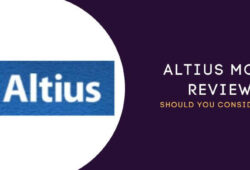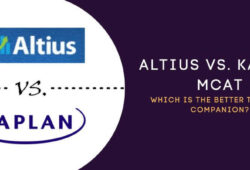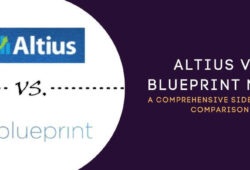Blueprint is a well-recognized MCAT test prep company that’s highly acclaimed by many students.
But then again, the exact same thing can be said of Princeton Review, hence the great Blueprint Vs. Princeton Review MCAT debate.
On the one hand, you have a prep course with an excellent, logically laid out MCAT curriculum, while on the other hand, you have an incredibly in-depth prep course covering all the MCAT subjects in great detail.
So how do you decide between Blueprint MCAT Vs. Princeton Review?
Blueprint MCAT Vs. Princeton Review Comparison Table
Blueprint MCAT | Princeton Review | |
Price Range | $1,999 to $10,499 | $1,999 to $11,000 |
Access Period | 6, 9, Or 12 Months | 1 Year |
Diagnostic Exams | 1 | 35 |
Full-Length Practice Tests | 10 | 16 |
Practice Questions | 10,000+ | 2,500+ |
Customizable Study Plan? | Yes | No |
Inclusion Of AAMC Practice Materials? | Yes | Yes |
MCAT Books | 6 | 8 |
Mobile App? | No | Yes |
Score Increase Guarantee? | Yes | Yes |
Blueprint MCAT Vs. Princeton Review Overview
Blueprint MCAT is particularly known for its stellar curriculum and incredibly representative MCAT practice material that closely replicates what you should expect on the actual exam.
The company offers different MCAT prep options, with their cheapest course being the 6-month self-study online course valued at $1,999 and their most expensive option being the 40-hour premium tutoring plan priced at $10,499.
In between the two extreme course options, your other choices include a Live Online course, a 515+ course, and a 1-month immersive prep experience.
At the most basic level, here’s what you get once you sign up for any of the Blueprint MCAT courses:
- 160 interactive learning modules.
- Customizable study planner tool.
- Live office hours 6 days per week.
- Access to recorded Office Hour sessions.
- AI-powered Qbank with 4,000+ discrete questions.
- Custom-tailored MCAT practice sets.
- Ability to test out of lessons.
- An online note-taking journal tool.
- 1,600+ MCAT flashcards.
- 10 full-length MCAT practice exams with detailed explanations.
- 6 MCAT content review books.
- Access to all official AAMC online resources.
- Advanced analytics to target weak areas.
- Score increase guarantee.
Princeton Review is best known for its exceptionally detailed content review that comprehensively covers virtually everything you need to know going into med school.
Their cheapest MCAT prep course is the Self-Paced course valued at $1,999, while their priciest option is the 60-hour comprehensive tutoring package that costs $11,000.
Aside from the self-study and tutoring options, your other choices include the LiveOnline course, the 513+ course, and the 515+ summer immersion.
Here’s what’s contained in the basic Princeton Review MCAT prep package:
- 500+ expertly crafted, on-demand content videos.
- 16 full-length online practice tests with detailed explanations.
- 8 MCAT review books.
- MCAT flashcards.
- 1-year access to all course materials.
- Unlimited access to subject-specific live Q&A office hour sessions.
- All official AAMC materials and online Flashcards.
- Thousands of practice questions.
- Access to Medical School Admissions Advantage Sessions.
- Better score guarantee.
Blueprint MCAT Vs. Princeton Review Detailed Comparison In 2024
Price
One of the significant differences you will notice between Blueprint and the Princeton Review is in the pricing of their MCAT course packages.
While the Princeton Review has a constant price within each package, Blueprint MCAT’s course prices vary depending on the access period you are signing up for. Ideally, each course has three package options: a 6-, 9- or 12-month subscription. (see also Blueprint MCAT discount codes)
For instance, Princeton Review’s LiveOnline course will cost you $2,799. This is the only option available, and it comes with 1-year access to the course materials.
On the other hand, Blueprint’s 6-month Live Online course costs $2,599, the 9-month package costs $3,049, and their 12-month package is priced at $3,499.
Let’s compare the self-paced and live online courses offered by the two companies.
Self-Paced MCAT Course Comparison | ||
Course Access Length | Blueprint MCAT | Princeton Review |
6 Months | $1,999 | - |
9 Months | $2,449 | - |
1 Year | $2,699 | $1,999 |
Live Online MCAT Course Comparison | ||
Course Access Length | Blueprint MCAT | Princeton Review |
6 Months | $2,599 | - |
9 Months | $3,049 | - |
1 Year | $3,499 | $2,799 |
As you can see, although the two courses cost roughly the same, Blueprint is a more expensive option.
What you get for a year’s access on Princeton Review is equivalent to only 6 months of access with Blueprint MCAT.
Should you wish to get a year’s access on Blueprint, you will end up paying about $700 more than what you’d pay on Princeton Review.
So as far as price comparison goes, Princeton Review is actually priced much lower than Blueprint MCAT over the same subscription length.
Course Curriculum
One of Blueprint’s highlights is the organization of its MCAT content.
Their syllabus comprises 160 learning modules, split into 130 content modules and 30 strategy modules. Combined, you get hundreds of hours of visually engaging and entertaining video content.
Blueprint’s MCAT course border is designed around spaced repetition. A concept is first introduced and then later built upon gradually in the course of your study period.
Better yet, all this has already been laid out for you in your personalized study plan, so you won’t waste valuable study time wondering how to approach the modules, which module to tackle first, and so on.
Rather than only studying a particular subject a week, Blueprint’s curriculum allows you to work through multiple science content areas each week. This helps to keep things engaging, helping you remain focused throughout your MCAT prep period.
At the same time, the modules are organized cumulatively, starting off with simpler content, such as the foundations of a given subject, then gradually building up to more challenging MCAT concepts and material.
Content modules are interspersed among the strategy modules such that by the time you encounter a concept in a strategy module, you’ve already covered it in a content module and so are prepared to experience the application of the content learned.
Overall, Blueprint’s organization of their MCAT study material is highly commendable, allowing learners to experience a fun and logical study process that optimizes content retention.
Princeton Review has a very intense, content-heavy curriculum.
On the one hand, this could work for non-traditional students who covered their prerequisites quite a while back and would need a deeper refresher before facing the MCAT.
On the other hand, this incredibly dense syllabus can easily come across as overbearing and overwhelming as students try to sift through the information distinguishing between high-yield and low-yield concepts.
The Princeton Review MCAT course has too much content, going into great detail. This is not necessarily a good thing, as students can be left feeling overwhelmed, confused, and unmotivated.
Furthermore, with Princeton Review, it is really hard to tell how much knowledge you need to possess in the various areas. All MCAT subjects have been covered extensively, but the actual MCAT does not necessarily test each subject to such great knowledge depth.
So as far as the course curriculum goes, Blueprint MCAT has the upper hand here for having an impeccably organized MCAT course syllabus that’s easy to follow through, allowing students to cover more ground faster.
Content Video Lessons
Blueprint’s video lectures are very helpful, concisely covering high-yield MCAT topics in a direct and easy-to-understand manner.
The fun, bite-sized video lessons featuring animations, illustrations, and graphics are not only highly engaging, but they also enhance content retention.
Complex biological systems and chemical processes have been illustrated in a manner that’s very easy to visualize, offering a far better explanation for complex concepts than what you’d find in any textbook.
Blueprint’s dynamic video lessons apply to both the pre-recorded on-demand videos and the live instruction lectures.
Princeton Review’s video lessons are rich in detail and content, and the knowledgeability of the instructors is very evident in each lecture.
They have an extensive library of over 500 on-demand lessons known as MedFlix videos.
These on-demand Medflix videos are rather humdrum, leaving much to be desired. These videos are neither visually appealing nor engaging, so you will often find your mind lacking focus and stimulation while watching the lessons.
Nevertheless, the lecturers do a pretty great job at covering every single MCAT concept. But because there is so much ground to cover, the lecturers tend to move through the material rather quickly.
If you are not particularly inclined toward visual engagement, you may actually be just fine going through Princeton Review’s on-demand videos. However, their live lectures are far more interesting than their on-demand lessons.
All in all, Blueprint’s video lessons, both the live instruction and the pre-recorded ones, are stellar in their content coverage, visual appeal, and learner engagement, keeping the MCAT material fun, concise, and easy to comprehend.
Practice Materials
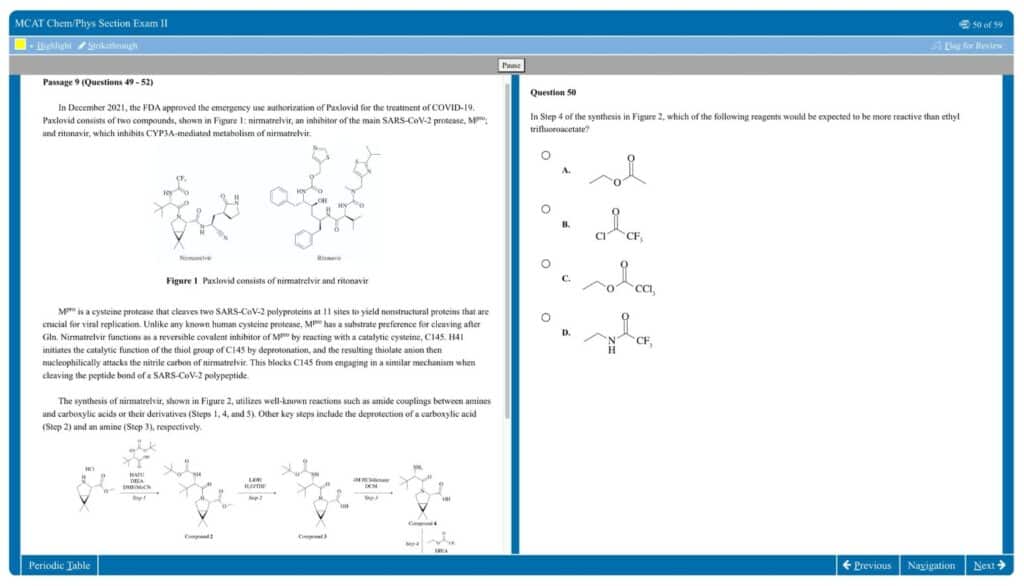
Blueprint comes packed with a ton of both free and premium MCAT practice material. You have a diagnostic test, module assessment quizzes, end-of-chapter exams, 10 full-length practice exams, and over 4,000 practice questions in the QBank.
Blueprint practice exams are very representative of the real MCAT. In fact, in comparison to other MCAT prep providers, Blueprint is widely recognized as being highly representative of the actual MCAT.
They offer very realistic practice regarding the content tested and how the questions are structured and worded.
As for free MCAT practice material, Blueprint offers a half-length diagnostic MCAT exam and a free full-length practice exam.
Princeton Review similarly comes packed with plenty of MCAT practice material. You have several subject-based tests and diagnostic exams, 16 full-length exams, and thousands of practice questions.
Princeton Review’s tests are incredibly hard and not representative of the real MCAT. Nonetheless, these offer great practice for content review. At the same time, these exams are great for building your stamina and working on your test timing.
Overall, Blueprint MCAT has far better practice material than Princeton Review. Their tests offer more realistic MCAT practice, and their free practice materials are definitely a bonus.
Office Hours
One crucial element of any MCAT prep course, even beyond the content review and the practice material, is the Office Hours.
During your MCAT prep, you are bound to come across certain MCAT concepts that are simply more difficult to comprehend than others. And no matter how hard you try and how much it’s been taught to you, you simply cannot seem to comprehend the concept at hand.
Office Hours are an excellent opportunity to go over those hard-to-understand topics with an expert MCAT instructor.
Blueprint and Princeton Review both include live Office Hours in all their MCAT courses, including the self-paced courses.
Let’s closely examine what each company offers within the Office Hours of their self-paced programs.
For Blueprint, Office Hours occur 6 days a week. They comprise group sessions, and students have unlimited access to any Office Hours they wish to attend.
Each session lasts about 2 hours, and besides taking a deep dive into a particular focus area, they also include open Q&A so you can ask the instructor anything on any subject.
For Princeton Review, Office Hours similarly occur 6 days a week, but in this case, the sessions are subject-specific.
Each session is dedicated to a particular subject area, meaning the 6 days are divided into Biology/Biochemistry, CARS, General Chemistry, Organic Chemistry, Physics, and Psychology/Sociology.
Each session is 1 hour long, and these Q&A-based sessions are led purely by your questions.
With Blueprint MCAT, you can ask any pressing question you may have in any Office Hours session during the open Q&A session. With Princeton Review, the question you ask has to be in line with the specific subject focus of the particular Office Hours sessions. Otherwise, you will have to wait till the next subject-relevant session.
So, for lasting longer, being more diverse, and offering more flexibility in its structure, Blueprint takes the upper hand when it comes to Office Hours.
Course Personalization
Ultimately, all students have their unique MCAT journeys, and no one person’s preferences are precisely similar to another’s.
As such, the best MCAT prep course should reflect this as well, allowing for personalization of the course to best suit your content knowledge, learning style, and MCAT goal score.
Blueprint MCAT provides a tailored study experience in the following ways:
- Allows the option of testing out of lesson modules.
- Provides a customizable online study planner.
- Uses an AI-driven QBank.
- Offers flexible live office hours.
- Has flexible, reschedulable live class schedules.
These personalization tools allow each student to have a truly unique MCAT prep experience even though they may be using the very same Blueprint MCAT course.
You get to use the study materials and practice resources as they best suit you, based on your diagnostic exam base score and your respective strengths and weaknesses, learning pace and style, study time availability, etc.
Princeton Review’s MCAT prep courses don’t really offer such a personalized study experience, except perhaps for their Q&A Office Hours sessions.
So Blueprint has the clear upper hand here. They allow you to tailor their MCAT course to your very specific study needs and goals, making your MCAT prep that much more efficient and meaningful.
MCAT Books
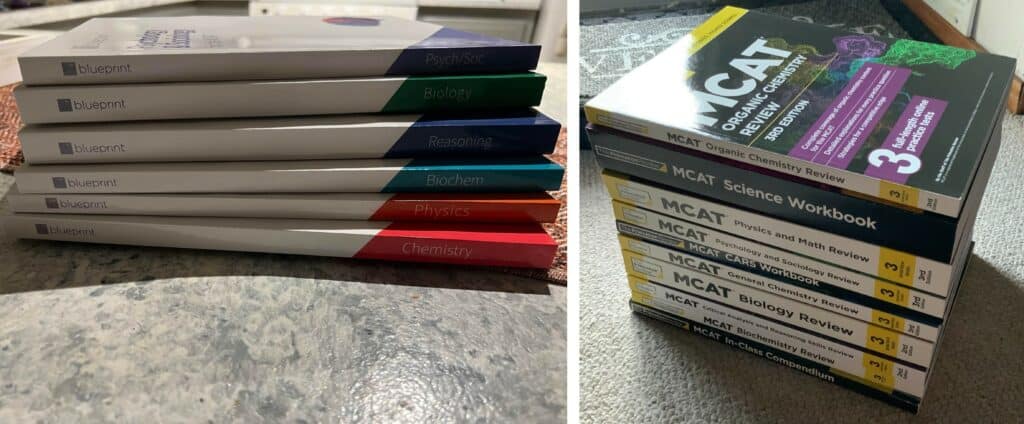
All Blueprint MCAT and Princeton Review courses come with access to hardcopy MCAT books covering all the MCAT subjects.
Similar to their content videos, Blueprint MCAT prep books are concise and very easy to understand, filled with pictures and fun animations.
Blueprint has structured its MCAT books and lesson plans to go hand-in-hand. Each lesson video highlights exactly what chapter and section you need to review in the books if you need to understand the topic better. That’s quite handy.
Furthermore, the books’ end-of-chapter practice questions are available online, allowing for a nice seamless integration with Blueprint’s online courses.
The Princeton Review MCAT books are very detail-packed and in-depth, similar to their content video lessons. Their content review is incredibly comprehensive, giving a deep dive into all the MCAT subjects.
Overall, Blueprint’s books are more of a supplement to their content lessons, while Princeton Review books give an independent deep dive into MCAT content review.
Verdict: Which One Is Better?
Blueprint MCAT prep has plenty of commendable aspects to it.
First off, they have a very detailed curriculum covering exactly what you need to know for the MCAT exam. There is no fluff, and high-yield concepts have all been covered in great detail.
Not to mention that the course structure, broken down into modules, is very well organized for effective studying and content retention.
This test prep course doesn’t just teach MCAT test content. Instead, they teach you how to take the MCAT exam.
From their video lessons to their Office Hours and MCAT books, Blueprint MCAT students are equipped with a ton of MCAT-specific skills, techniques, and test-taking strategies, showing you how to connect and apply specific MCAT knowledge to various question scenarios.
Another commendable thing is their visually appealing lessons and written material, full of helpful animations and illustrations that help make the MCAT material much easier to grasp and remember in the long term.
Lastly, Bluepritn’s QBank feels endless, and the quality of their practice is top-notch, considering that Blueprint practice tests are among the most representative of any MCAT prep providers.
The one downside to this prep course is its course access periods. Compared to Princeton Review MCAT, Blueprint MCAT tends to be more expensive when assessing the same course access durations.
Nonetheless, Blueprint MCAT really does give value for money.
Princeton Review MCAT prep also has plenty of commendable elements to it.
To begin with, their deep and extensive curriculum is perfect for non-traditional applicants who are looking for more detailed content reviews.
Aside from that, their live online classes are really well done, taught by a team of 4-6 subject matter MCAT experts who truly know their content.
Their practice exams are not as representative as Blueprint MCAT practice tests, but they are still valuable in building your mental endurance and stamina.
Blueprint and Princeton Review are both solid MCAT prep options, but ultimately, one has to have a clear upper hand over the other.
Blueprint is the better MCAT prep option, owing to its customized study schedule, top-notch on-demand lessons, highly representative practice materials, and perfectly laid out course curriculum that concisely covers just what you need to know for the MCAT.
Prepping for the MCAT isn’t just a matter of learning the content tested. Rather, you need to know how the material is actually tested, and in that regard, Blueprint MCAT prep does an absolutely stellar job.
Blueprint MCAT Vs. Princeton Review FAQs
Is Princeton Review Better Than Blueprint MCAT?
Princeton Review is better than Blueprint MCAT if you are looking for a prep course that goes into great detail and depth in its material coverage.
The only downside is that you will easily get lost in all the information presented, feeling overwhelmed and unable to tell the extent to which you should grasp certain MCAT concepts.
On the other hand, Blueprint MCAT is better than Princeton Review in that it offers a highly customizable MCAT study curriculum, has very representative practice tests, and provides plenty of free MCAT resources.
Blueprint MCAT Vs. Princeton Review: Which One Is Best For Content Review?
Blueprint MCAT is the best MCAT content review for the average student. Its material coverage is concise yet detailed, covering just what you need to know for the MCAT; nothing more and nothing less.
Not to mention that Blueprint does a great job of presenting even the most complicated MCAT concepts in a fun, entertaining manner that enhances content retention.
On the other hand, Princeton Review offers great content reviews for non-traditional students who haven’t reviewed MCAT material in a long time and are therefore looking for something more in-depth and extensive.
Are Blueprint MCAT Tests More Accurate Than Princeton Review?
Yes, Blueprint MCAT tests are more accurate than Princeton Review practice tests, giving a better idea of the content that’s tested on the MCAT and how questions are phrased and formatted.
While Blueprint’s practice test scores are deflated by around 4-7 points, Princeton Review’s test scores are heavily deflated by over 10 points.



